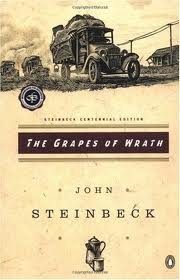Book Review: John Steinbeck’s “The Grapes of Wrath”
by Miles Raymer
It’s been ten years since I first read The Grapes of Wrath, and I now realize that my seventeen-year-old self was incapable of internalizing even a fraction of the tragedy and grace contained in this overwhelming story. A decade on, what was once fodder for my sophomoric literary intellect has recast itself as a narrative experience of the highest order. Page by page, John Steinbeck dragged my willing heart through the mud, filling it with visions of unimaginable hardship, incomparable kindness, and withered but resilient hope.
The book world has little use for yet another reviewer extolling the gritty realism of Steinbeck’s prose or the insightful precision of his characterization. Steinbeck is magnificent, one of the all-time great American writers, and I could write many detailed paragraphs explaining why this is so. And yet, at least with this reading, The Grapes of Wrath stubbornly defied even my most casual attempts to parse it in the usual manner, to peck and prod and flense until the story and its inhabitants were laid bare so I might pass judgment on them and their creator god. Instead, I found myself gripping the edges of my emotional sanity as I followed the Joad family on a doomed journey that I kept hoping would veer from its torturous trajectory. As with the Joads themselves, the mere act of hoping bestowed no such glimmering reward.
The Grapes of Wrath represents a timeless warning against the assurance of lucky people that our good fortune is well-deserved. It flies in the face of every bootstrap-based argument about self-determination and gives the lie to the consensual hallucination that Americans are a people whose foremost concern is and has ever been liberty, equality, and dignity for all. And it drives home a simultaneously distressing and uplifting fact: the poorest among us will keep going, keep trying, keep fucking, keep crying, keep laughing, and keep loving to the very end, no matter how bad things get. If those with means continue to serve as instruments of dehumanizing and corrupt systems, we will eventually be left with nothing but Steinbeck’s words echoing in our ragged ears:
The great owners, who must lose their land in an upheaval, the great owners with access to history, with eyes to read history and to know the great fact: when property accumulates in too few hands it is taken away. And that companion fact: when a majority of the people are hungry and cold they will take by force what they need. And the little screaming fact that sounds through all history: repression works only to strengthen and knit the repressed. The great owners ignored the three cries of history. The land fell into fewer hands, the number of the dispossessed increased, and every effort of the great owners was directed at repression. The money was spent for arms, for gas to protect the great holdings, and spies were sent to catch the murmuring of revolt so that it might be stamped out. The changing economy was ignored, plans for the change ignored; and only means to destroy revolt were considered, while the causes of revolt went on. (238)
It should be a source of collective shame and outrage that post-Depression America, while conferring significant improvements in standards of living for even the neediest citizens, has nevertheless failed to redress the foundational sources of discrimination, dispossession, and human cruelty that drove Steinbeck’s pen.
I’m still lookin’ for my Tom Joad. You found yours?
Rating: 10/10

Nicely written. I can’t believe you found time to squeeze this large but enthralling book into your reading schedule. As wages continue to stall, I can’t help but wonder if we are not but setting ourselves up once more for a Great Depression. During the past recession, it was nice to be able to draw on writers like Steinbeck for hope and inspiration.
Thanks for reading. I agree that this is a particularly good time to look to Steinbeck for guidance. The parallels between the Depression and today are striking. I was especially impressed and moved by the passage cited above, which could easily be used to describe the plight of 21st-century low-wage workers in the US and around the world.
[...] my adolescence, and is also probably the only book I’ve ever read three times. After a recent and extremely rewarding rereading of The Grapes of Wrath, I decided it was time to take up East of Eden once again. The book holds many memories, like that [...]